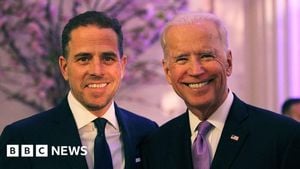The recent outcome of the 2024 UK General Election has stirred significant discussion and reflection across the political spectrum. The Labour Party, led by Keir Starmer, emerged victorious with what many have termed as a landslide win. Yet, beneath the celebratory surface lies complex layers of political maneuvering, shifting party ideologies, and the challenges posed by public sentiment.
Keir Starmer's ascent to the premiership was marked by promises of transformation and commitment to addressing pressing issues such as the cost of living crisis, public health concerns, and immigration policies. His victory speech delivered at the Tate Modern showcased his determination to navigate the nation through turbulent times, with major reforms on the agenda, especially following the waning popularity of the Conservative Party amid handling economic challenges and public dissatisfaction.
Starmer's Labour Party is now at a crossroads. The election results have ignited debates about the party’s ideological direction and whether it remains true to its leftist roots or has drifted more toward the center. Critics have voiced concerns over the rhetoric coming from Starmer, particularly surrounding immigration policies. His contention against the Tories’ alleged "open borders experiment" has been interpreted by some as playing directly to fears often exploited by the far-right, paralleling discourses from political figures such as Nigel Farage.
This shift raises pivotal questions: Does Labour still align with its traditional values, or is it sacrificing its ideological integrity for electoral gain? Starmer's communication style, influenced by the need to resonate with voters, risks alienation among some traditional Labour supporters who might view the party’s new tone as lacking authenticity.
For many, the underlying factors of immigration should be based on careful policy discussions rather than inflammatory language. The Migration Observatory at Oxford University points out the need for nuanced discussions considering various categories of migrants, such as those bound by limited-time contracts or students returning to their home countries after graduation. Starmer's emphasis on controlling immigration may resonate with immediate public sentiment but sidesteps broader, more challenging conversations surrounding the economy and societal needs.
The historical significance of Starmer's win extends beyond mere numbers. There’s discussion around how the electoral system itself and the nuances of voter behavior may have contributed to Labour's success. With the current electoral framework often criticized for favoring larger parties, many argue the ‘landslide’ narrative oversimplifies the reality of voter sentiments, especially those who might have voted Labour out of frustration with the Conservatives rather than active support for Labour’s agenda.
The political climate post-election indicates potential instability for Starmer's government. While there are many calls for immediate reformations, the reality of governing amid financial constraints, austerity measures, and the looming economic uncertainties makes decisive action all the more complicated. Starmer’s leadership could face significant hurdles, including maintaining party unity and addressing public grievances concerning economic policies.
Beyond domestic issues, the new Labour leadership carries the burden of re-establishing the UK’s position on the global stage, particularly concerning international relations. Starmer's approach appears closely aligned with the United States, which has traditionally been seen as both beneficial and detrimentally polarizing, particularly concerning issues like the situation with Israel and Palestine. Starmer's previous backing of the US stance has led to scrutiny from both his critics and some members within his party.
The ramifications of the election results and subsequent Labour government could potentially reshape the political discourse around immigration, economic strategies, and international relations. For Labour, the challenge will be balancing its historical inclinations toward progressive policy-making with the pressures of aligning with contemporary public sentiment, which may sometimes display contradictory demands.
Still, it’s not all doom and gloom for Labour. Starmer's team has the monumental task of reintegrative communications strategies aimed at rebuilding public trust. The party must work to articulate its visions with clarity and emotional resonance—a call echoed by various commentators who stress the importance of bridging the gap between political dialogue and public concern.
One can’t ignore the emotional backdrop against which this election unfolded. Feelings of disillusionment and anger have fueled political movements across the globe. The UK is no exception, with citizens yearning for leaders who understand their struggles and can convey these challenges with empathy and authenticity. The effectiveness of Starmer’s leadership, going forward, may depend on how well he can connect not just on policy grounds but emotionally with both his party and the electorate.
Looking to the future, anticipating the Labour Party's next steps will be pivotal. Navigational challenges remain, especially as public expectations climb and the effects of the previous government’s policies continue to ripple through society. It’s clear; Labour's path will need to be strategically calculated not only to maintain its seat of power but also to fundamentally address the realities facing the British public.
Meanwhile, the opposition, particularly the Conservative Party, will be under immense pressure to reassess its strategies and potentially realign its outreach efforts. The public's reaction to the Conservative handling of crises will shape future political conflicts, creating fertile ground for competition.
Whether Labour retains this momentum hinges on its ability to respond to public needs and desires convincingly. It’s imperative Starmer and his party learn to navigate the political terrains with more than just factual commentary; they need to weave emotional intelligence and authenticity back onto their political tapestries. Only then can Labour actively reclaim its traditional role as the people's party, serving the interests of all.



